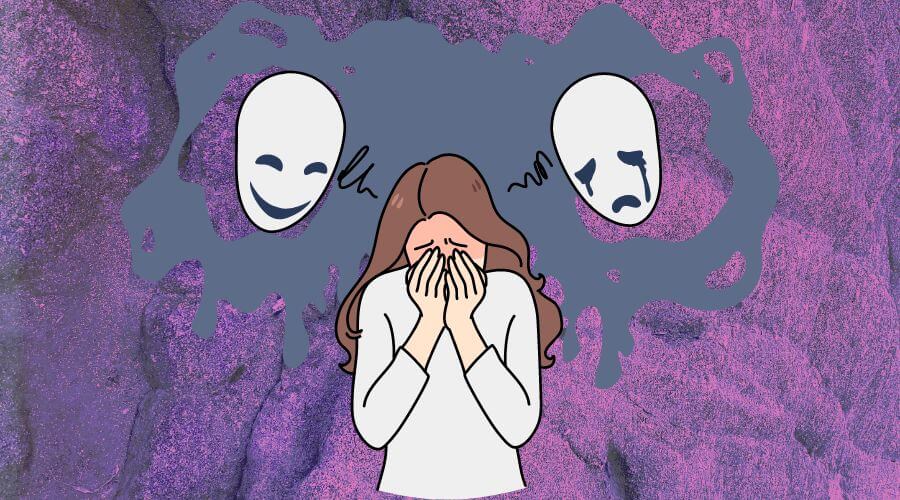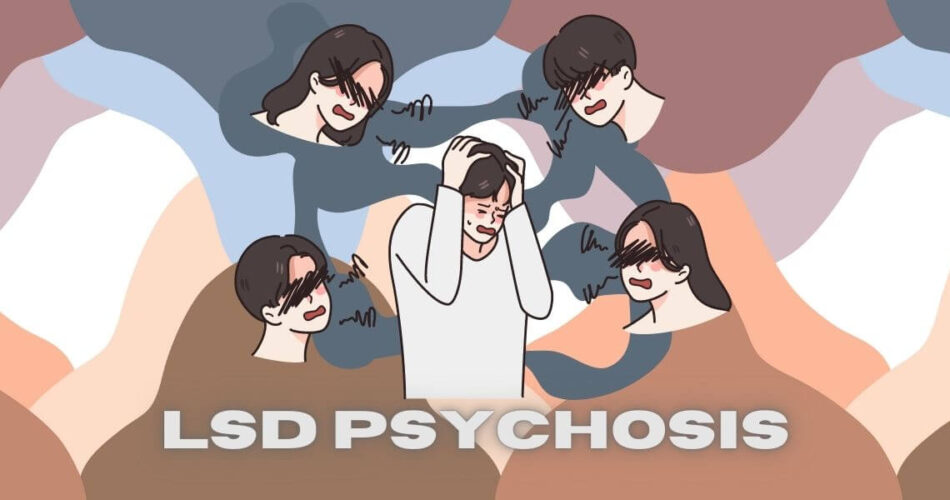Many people know about the dangers of LSD, but not many know about LSD psychosis. This is a condition that can be caused by taking LSD and can result in some very serious symptoms. Keep reading to learn more about LSD-induced psychosis.
TL;DR
- LSD can cause psychosis, a state of mind characterized by hallucinations, delusions, and paranoia.
- The effects of the drug can also cause flashbacks months or even years after the initial trip.
- The most common symptoms of psychosis caused by LSD use include visual and auditory hallucinations; delusions; paranoia; disorganized thinking and speech; severe anxiety or panic attacks; feelings of depersonalization or detachment from reality; extreme mood swings.
- It is important to note that LSD-induced psychosis is different from schizophrenia. While the behavioral symptoms of both may overlap, they are caused by different factors and require a different approach to treatment.
- There are a number of different substances that can cause psychotic symptoms and mental disorders, including: alcohol, marijuana, cocaine and other stimulants, PCP and other hallucinogens.
Can LSD Cause Psychosis?
Yes, LSD (lysergic acid diethylamide) can cause psychosis. Psychosis is a state of mind characterized by hallucinations, delusions and paranoia. When someone takes LSD, they may experience powerful visual and auditory hallucinations, as well as feelings of depersonalization and detachment from reality.
LSD psychosis may last several days, and in some cases up to several weeks. The effects of the drug can also cause flashbacks months or even years after the initial trip.
How to Recognize LSD-Induced Psychosis Symptoms?
The most common symptoms of psychosis caused by LSD use include:
- visual and auditory hallucinations;
- delusions;
- paranoia;
- disorganized thinking and speech;
- severe anxiety or panic attacks;
- feelings of depersonalization or detachment from reality;
- extreme mood swings.

LSD Psychosis or Schizophrenia?
It is important to note that LSD-induced psychosis is different from schizophrenia. While the behavioral symptoms of both may overlap, they are caused by different factors and require a different approach to treatment. Schizophrenia is a long-term psychotic disorder that can cause delusions, hallucinations and disorganized behavior. On the other hand, LSD-induced psychosis is usually temporary and will dissipate once the drug has worn off.
What Are Some Other Substances That Can Cause Psychotic Symptoms?
There are a number of different substances that can cause psychotic symptoms and mental disorders, including: alcohol, marijuana, cocaine and other stimulants, hallucinogens like PCP, ketamine and ecstasy. All of these drugs can cause feelings of paranoia, disorganized thoughts, hallucinations, and delusions. It is important to remember that if someone is using any of these substances, they should seek professional help in order to ensure safety and avoid any further psychotic episodes.
Treatment Options for Drug-Induced Psychosis
If someone is experiencing LSD-induced psychosis, it is important to seek medical help immediately. Treatment options for drug-induced psychosis vary depending on the individual and their needs, but may include antipsychotic medications, psychotherapy, and support groups. It is also important to remember that any substance abuse should be treated in order to ensure long-term sobriety.

Who Is Vulnerable to LSD Psychosis?
Anyone who uses LSD is vulnerable to developing LSD psychosis or LSD-induced schizophrenia. People with pre-existing mental health conditions, such as schizophrenia or bipolar disorder, are especially vulnerable to the effects of LSD and should avoid using the drug altogether. Additionally, anyone taking high doses of LSD or combining it with other drugs is also at risk for experiencing psychotic symptoms.
Editor’s Note
Psychosis caused by LSD use can be a very serious condition. If you or someone you know is experiencing any of the symptoms mentioned above, it is important to seek medical help right away. While this type of psychosis is usually temporary, it can have long-lasting effects if not treated properly. Remember that the best way to prevent drug-induced psychosis is to avoid using drugs altogether.
LSD Psychosis as a Symptom of Withdrawal
Finally, it is important to note that LSD psychosis can also be a symptom of withdrawal from the drug. While this is usually not as severe as an acute psychotic episode caused by substance use, it can still cause disturbing visual and auditory hallucinations. If someone has been using large amounts of LSD over a long period of time, they should seek professional help in order to safely detox from the drug and fight the addiction.
LSD and Psychosis. Summary
LSD is a hallucinogenic drug that can cause powerful visual and auditory hallucinations, delusions, paranoia, and feelings of depersonalization and detachment from reality. It is important to seek medical help immediately if you or someone you know is experiencing LSD psychosis. Additionally, people with pre-existing mental health conditions should avoid using the drug altogether, as they are especially vulnerable to the effects of LSD.
Frequently Asked Questions
What Are the Long-Term Effects of LSD Psychosis?
The long-term effects of LSD psychosis can include anxiety, depression, flashbacks, and difficulty concentrating. In rare cases, it can also lead to permanent psychosis.
How Is LSD Psychosis Treated?
Treatment for LSD psychosis typically includes cognitive behavioral therapy, medications, and supportive therapy. In some cases, hospitalization may be necessary.
Is LSD-Induced Psychosis Dangerous?
LSD-induced psychosis can be dangerous if not treated properly. It is important to seek medical attention right away if you or someone you know is experiencing this condition.
Similar Posts:
- LSD and Schizophrenia: The Connection Between Them | Psychedelic Drugs
- Side Effects of Shrooms: Are Magic Mushrooms & Psilocybin Safe?
- LSD Addiction Treatment Programs and Signs of LSD Abuse
- Withdrawal Symptoms of LSD and Treatment Options
- Facts About LSD: Everything You Need to Know About LSD
- Can U Die From Shrooms? Psilocybin, Magic Mushrooms & Potential Danger
- How to Tell If Someone Is On LSD? Signs of LSD Abuse and LSD Addiction




